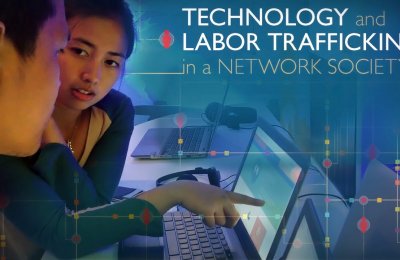By Amelia Brodka
Student Writer
“The system we have now is irrelevant to the media of the future,” Michigan State University professor Steven S. Wildman said as he argued that economic forces are eliminating Hollywood's ability to control the distribution of content.
“The new media have a different economic logic and that gives rise to different industrial structures and different service structures. And so in that case, the medium is the message and the message is the message,” Wildman said. (Video of his entire presentation will be available soon.)
Dean Ernest J. Wilson III and School of Communication professor Christopher Holmes Smith joined Wildman, the James H. Quello Chair for Telecommunication Studies at MSU, at the Feb. 17 event: “Explaining Structures and Flows for Media Markets: The Medium is the Message, but the Message is Too.”
The discussion was a part of USC Annenberg's Media, Economics and Entrepreneurship M{2e} speaker series. The M{2e} initiative is designed to spark innovation in media industries by increasing understanding of how economics impacts communication and journalism. Four more events remain in this semester's speaker series.
Smith introduced Wildman’s research as an exploration of the many ways that information communication technology and the policy overseeing its development have an impact on media firms, business models and strategic decision making.
“All of these strategic decisions could regard anything from content development to pursuing profit maximizing groups of distribution and also content bundling and pricing,” Smith said.
Wildman’s speech focused on two questions: What motivates flow in media products? How is newer technology changing the underlying structural underpinnings of the media?
In order to address his first question, Wildman traced the movement of films among geographic regions. He accentuated the global box office dominance of American films to show that media flows typically move from financially large to financially small markets, making them highly imbalanced.
“Financial basis motivates flows,” said Wildman, adding that the larger and wealthier the potential audience, the more content will be created to appeal to those audiences.
“Commercial motivations lead to trying to attract larger audiences,” which leads to “an overconsumption of content that has no larger payoff to society and an under consumption of content that we really need in order to create informed citizens,” Wildman said.
However, “we can see that the new media, the logic of the Internet, especially the fact that content is downloaded from servers as opposed to being streamed from separate independent channels, is changing the logic of organizations and the structures of these industries,” Wildman said as he discussed the challenges facing push-based broadcast media in today’s on-demand culture.
He said economic logic and convenience will overwhelm the older system, pointing to a figure showing that more than 50 percent of all viewing occurs at times other than when a program is broadcast.
In respect to the flow of media, the rise of Internet media has created the incentive to be inclusive and to feature a broader range of content.
“As you get more competition, you get more fragmentation,” Wildman said. “Budgets will become smaller, which will help even flows across countries.”
“The notion of programming has become irrelevant,” he added.
Wildman predicted that in five to 10 years there will be an unimaginable amount of content available that will force media providers to move to an economically logical system and focus on repackaging their content to be made downloadable from servers.
M{2e} speaker series
Event Photos









